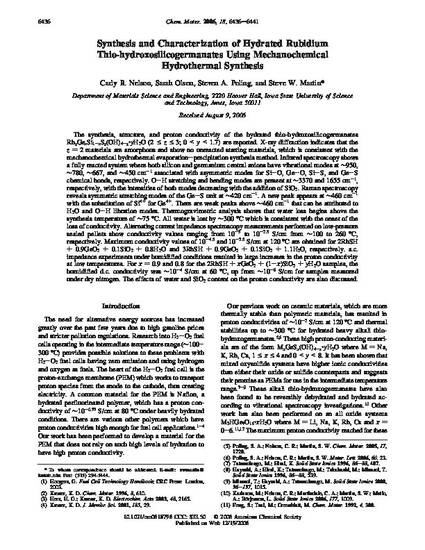
The synthesis, structure, and proton conductivity of the hydrated thio-hydroxosilicogermanates RbzGexSi1-xSz(OH)4-z·yH2O (2 ≤ z ≤ 3; 0 < y < 1.7) are reported. X-ray diffraction indicates that the z = 2 materials are amorphous and show no unreacted starting materials, which is consistent with the mechanochemical hydrothermal evaporation−precipitation synthesis method. Infrared spectroscopy shows a fully reacted system where both silicon and germanium central anions have vibrational modes at 950, 780, 667, and 450 cm-1 associated with asymmetric modes for Si−O, Ge−O, Si−S, and Ge−S chemical bonds, respectively. O−H stretching and bending modes are present at 3370 and 1655 cm-1, respectively, with the intensities of both modes decreasing with the addition of SiO2. Raman spectroscopy reveals symmetric stretching modes of the Ge−S unit at 420 cm-1. A new peak appears at 460 cm-1 with the substitution of Si4+ for Ge4+. There are weak peaks above 460 cm-1 that can be attributed to H2O and O−H libration modes. Thermogravimetric analysis shows that water loss begins above the synthesis temperature of 75 °C. All water is lost by 300 °C which is consistent with the onset of the loss of conductivity. Alternating current impedance spectroscopy measurements performed on low-pressure sealed pellets show conductivity values ranging from 10-5 to 10-2.5 S/cm from 100 to 260 °C, respectively. Maximum conductivity values of 10-4.5 and 10-3.5 S/cm at 120 °C are obtained for 2RbSH + 0.9GeO2 + 0.1SiO2 + 0.8H2O and 3RbSH + 0.9GeO2 + 0.1SiO2 + 1.1H2O, respectively. a.c. impedance experiments under humidified conditions resulted in large increases in the proton conductivity at low temperatures. For x = 0.9 and 0.8 for the 2RbSH + xGeO2 + (1−x)SiO2 +yH2O samples, the humidified d.c. conductivity was 10-4 S/cm at 60 °C, up from 10-8 S/cm for samples measured under dry nitrogen. The effects of water and SiO2 content on the proton conductivity are also discussed.
Available at: http://works.bepress.com/steve_martin/5/

Reprinted with permission from Chemistry of Materials 18 (2006): 6436–6441, doi:10.1021/cm0618796. Copyright 2006 American Chemical Society.